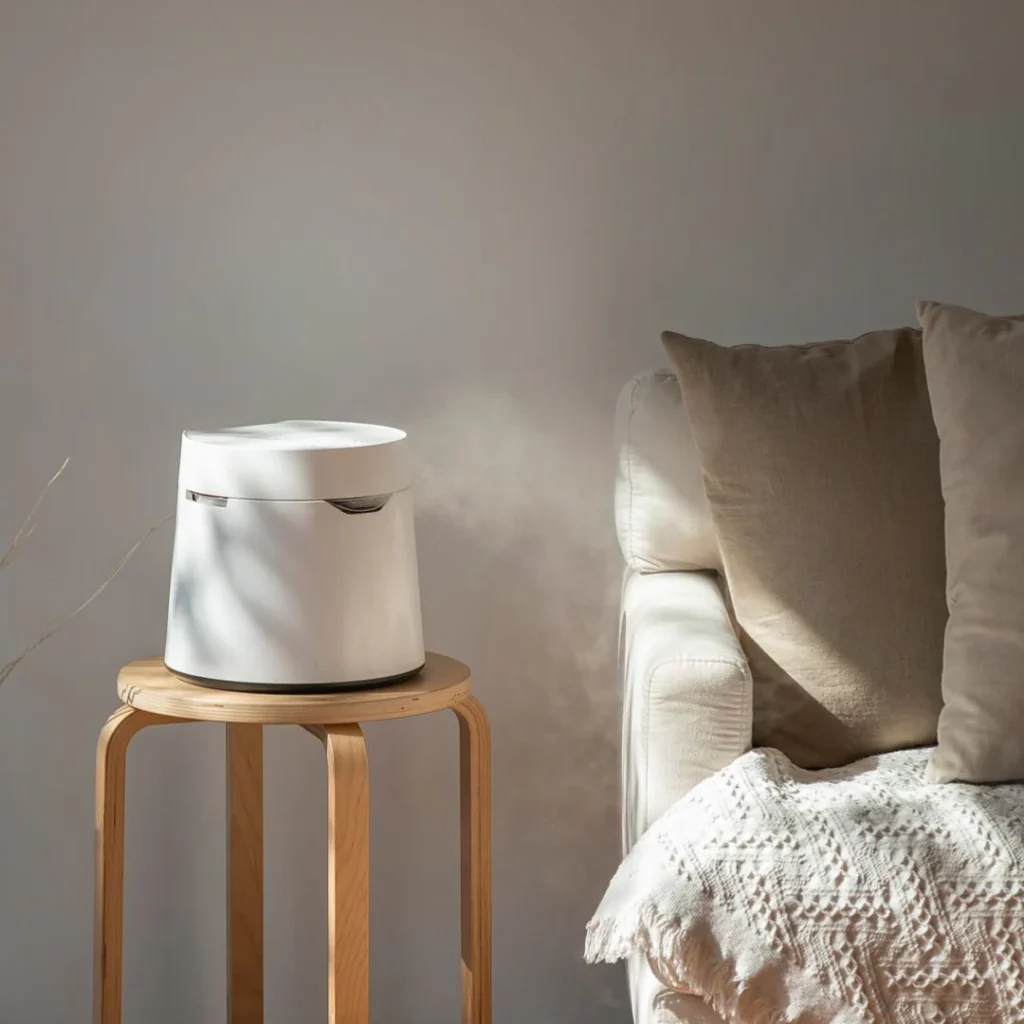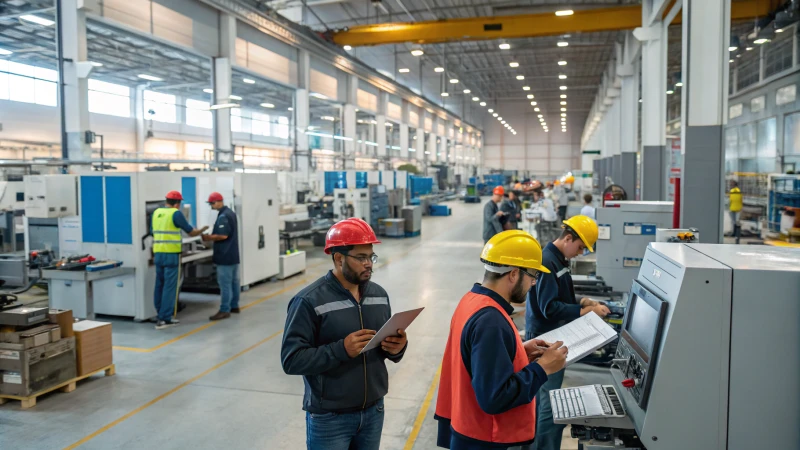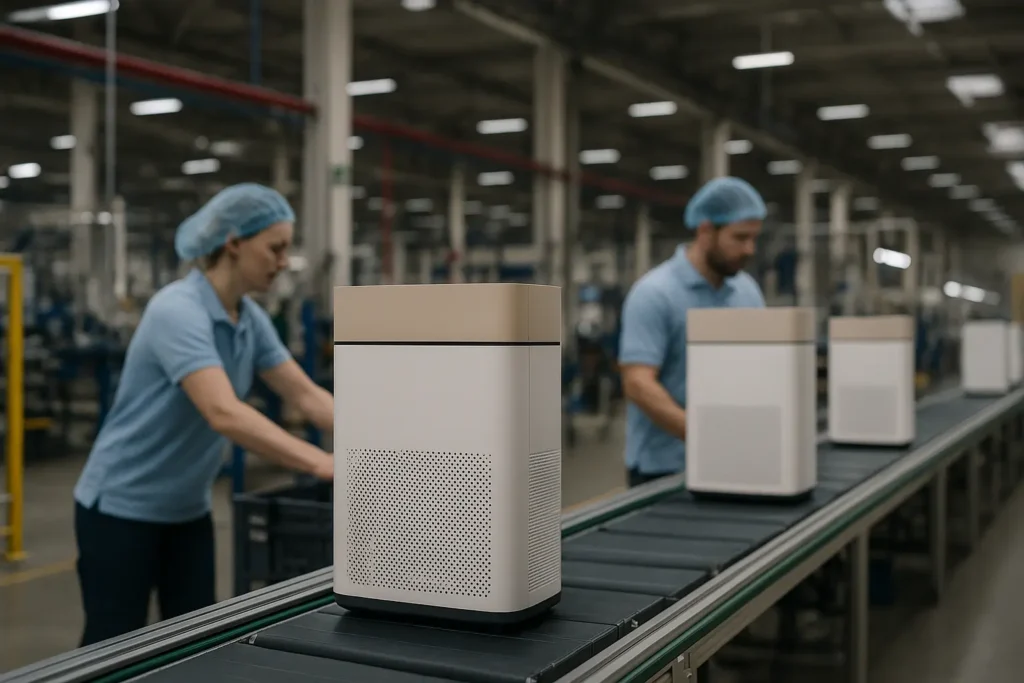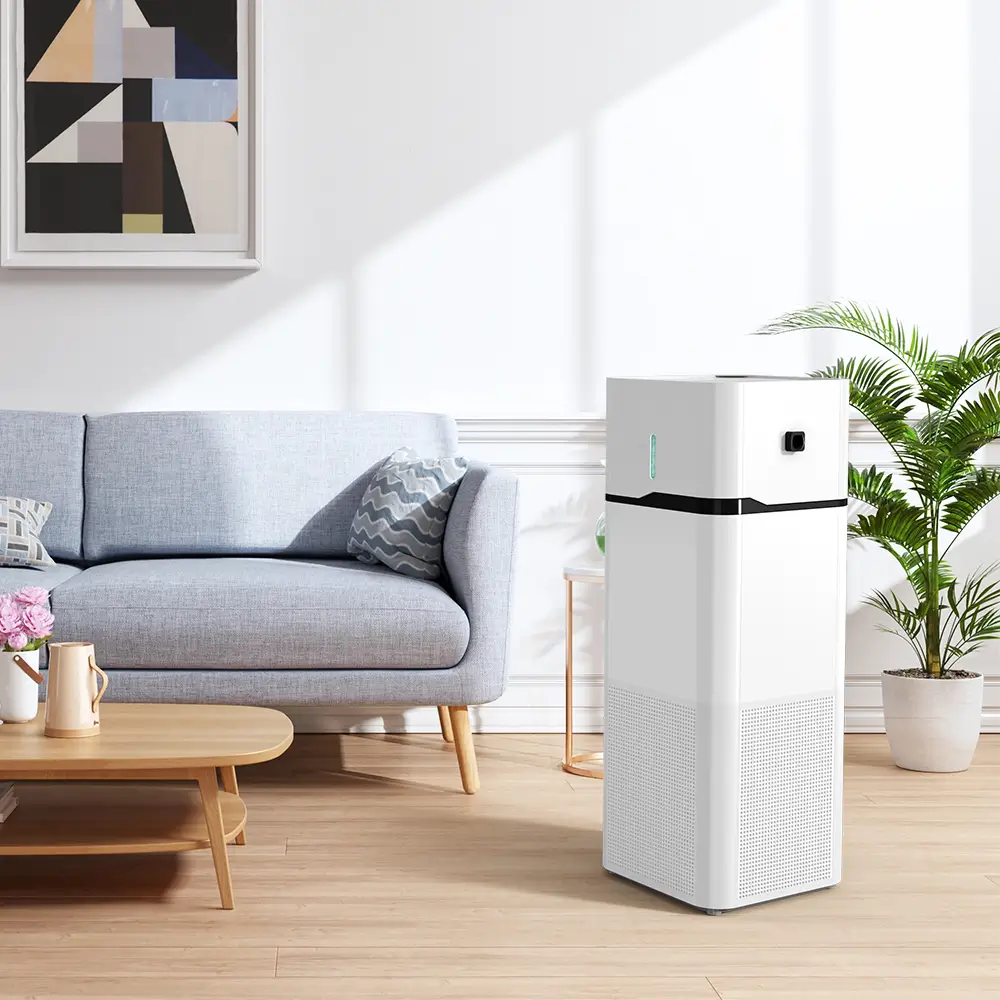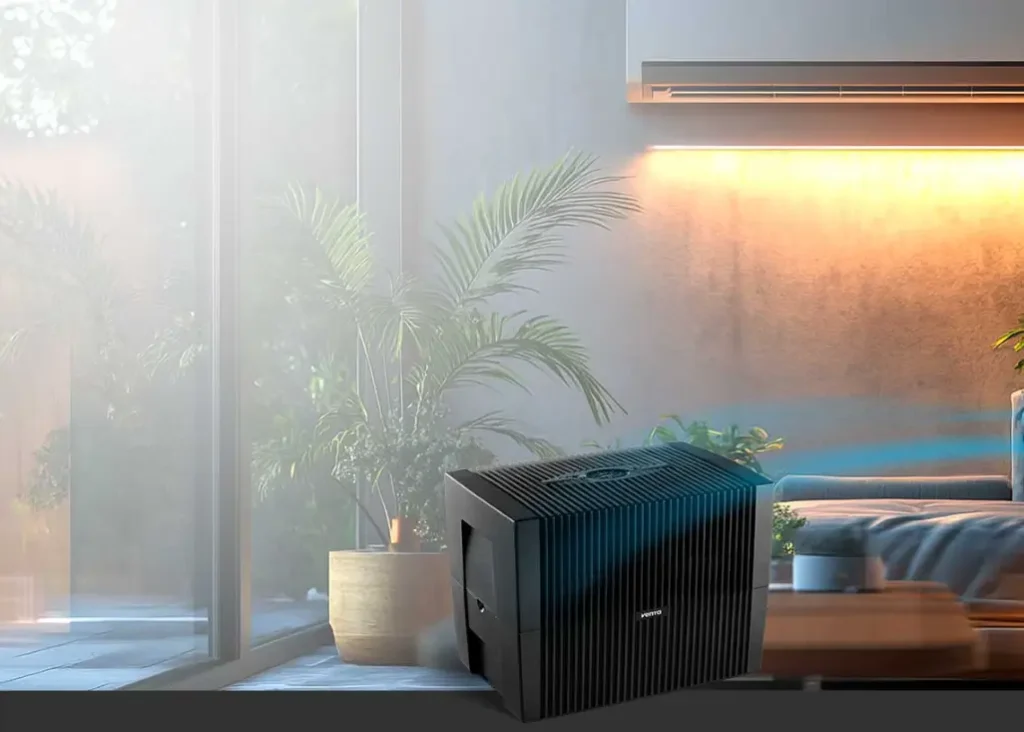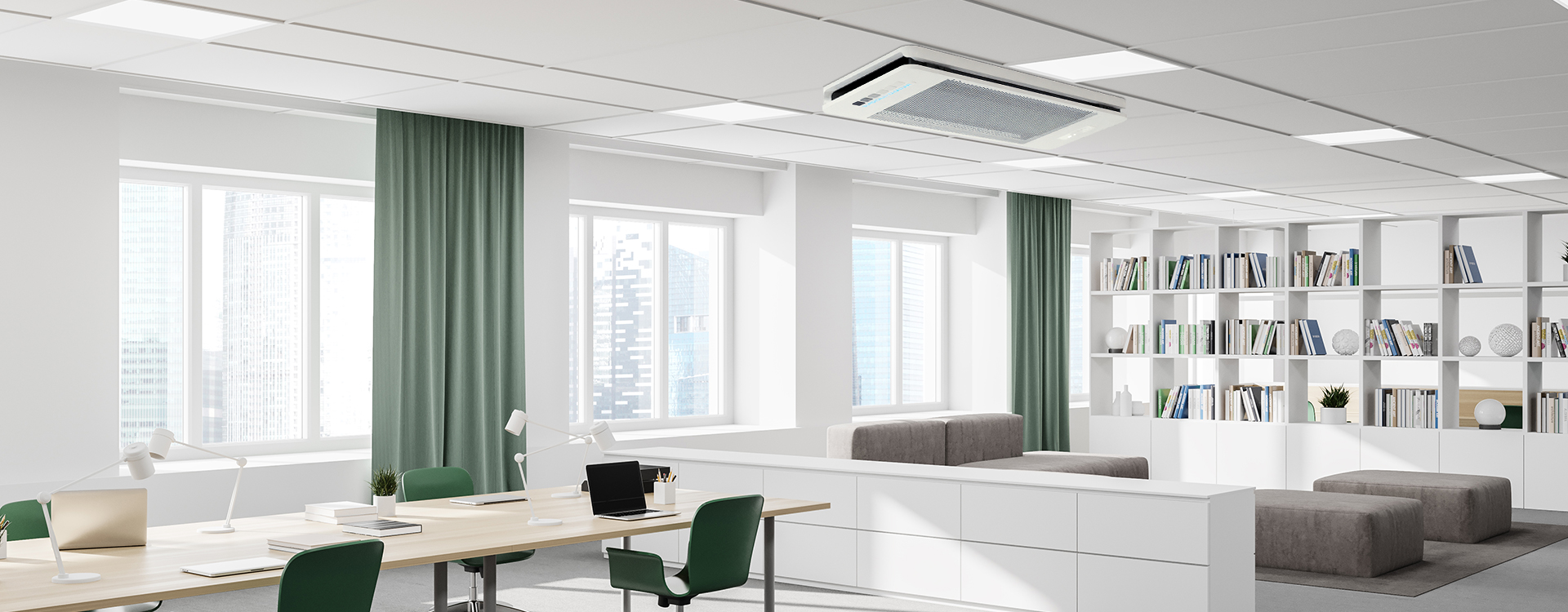
Um escritório espaçoso e bem iluminado com um purificador de ar hisoair instalado no teto para melhorar a qualidade do ar.
Introdução
Os filtros HEPA são uma escolha popular na purificação do ar, capturando partículas transportadas pelo ar e melhorando a qualidade do ar em vários ambientes. Mas o que é que torna os filtros HEPA tão eficazes e será que são a melhor opção para todos os tipos de necessidades de purificação do ar?
A poluição do ar não é apenas um problema exterior; a qualidade do ar interior também tem um impacto significativo na nossa saúde. Os filtros HEPA tornaram-se essenciais nos purificadores de ar devido à sua eficiência comprovada na captura de partículas como pó, alergénios, bactérias e até vírus. São amplamente utilizados em casas, escolas, hospitais e escritórios pela sua fiabilidade e eficácia na manutenção de um ambiente interior limpo.
Os filtros HEPA, abreviatura de High-Efficiency Particulate Air (filtros de partículas de ar de elevada eficiência), são conhecidos por reter 99,97% de partículas tão pequenas como 0,3 mícrones, proporcionando um ar mais limpo ao capturar pó, pólen, pêlos de animais e até algumas bactérias e vírus. A sua elevada eficiência torna-os uma solução fiável tanto em ambientes residenciais como comerciais, oferecendo uma melhoria essencial da qualidade do ar onde é mais necessária.
Os filtros HEPA são altamente eficazes em vários ambientes, capturando 99,97% de partículas tão pequenas como 0,3 microns.Verdadeiro
Devido à sua elevada eficiência, os filtros HEPA são normalmente utilizados em casas, escolas, hospitais e escritórios para melhorar a qualidade do ar.
Se está a pensar se um purificador de ar com filtro HEPA é a melhor escolha para o seu espaço, vamos analisar mais detalhadamente como funcionam os filtros HEPA, como se comparam com outras tecnologias de filtragem e quais os benefícios únicos que trazem para diferentes ambientes.
O que é um filtro HEPA?
HEPA (Ar Particulado de Alta Eficiência) Os filtros são concebidos para reter 99,97% de partículas tão pequenas como 0,3 mícrones, o que é Eficiência da filtragem HEPA1incluindo pó, pólen, pêlos de animais e determinadas bactérias e vírus. Este nível de filtragem é ideal para ambientes que exigem elevados padrões de qualidade do ar, como casas, hospitais e escritórios.
Porque é que os filtros HEPA são altamente eficazes para a limpeza do ar
Os filtros HEPA são excelentes na captura de partículas minúsculas, proporcionando assim um ambiente interior mais limpo e saudável. São especialmente benéficos para pessoas com alergias ou sensibilidades respiratórias, uma vez que reduzem os alergénios e poluentes comuns no interior.
Como é que os filtros HEPA retêm os contaminantes transportados pelo ar?
Os filtros HEPA são constituídos por uma densa rede de fibras que capturam partículas através de vários mecanismos de filtragem, como a interceção, a impactação e a difusão. À medida que o ar flui através do filtro, estas fibras capturam partículas grandes e pequenas, assegurando um elevado nível de limpeza e qualidade do ar.
Sim, os filtros HEPA são adequados para instalações médicas.Verdadeiro
Devido à sua elevada eficiência, os filtros HEPA são frequentemente utilizados em ambientes médicos para garantir um ar livre de contaminantes.
Porque é que os filtros HEPA são eficazes nos purificadores de ar?
Os filtros HEPA são altamente eficazes devido à sua conceção única, que lhes permite capturar uma vasta gama de partículas transportadas pelo ar. Em ambientes sensíveis, como instalações médicas, esta eficiência é crucial para manter uma qualidade de ar segura e limpa.
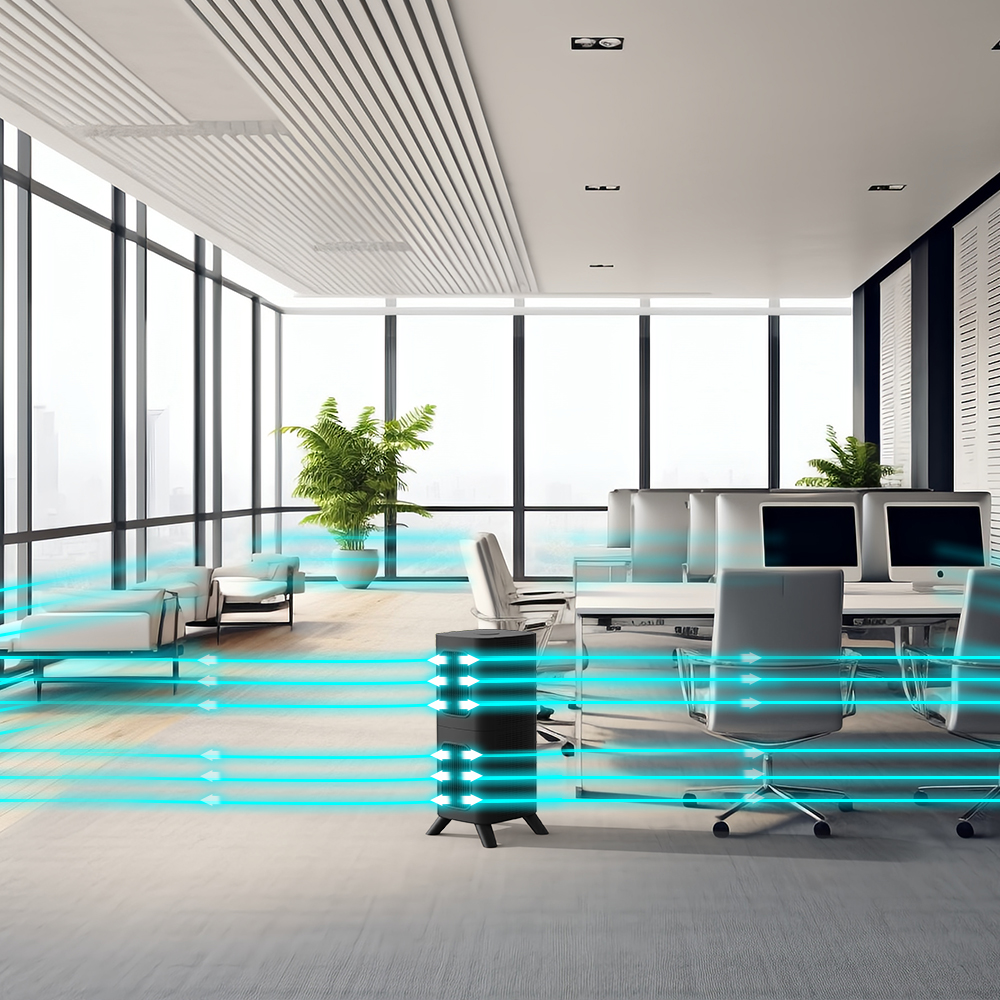
Unidade purificadora de ar com filtro HEPA instalada numa sala de escritório
Compreender o funcionamento dos filtros HEPA
Os filtros HEPA funcionam forçando o ar a passar através de uma malha fina, que retém as partículas nocivas de forma mais eficaz do que os filtros convencionais, em vez de Utilização médica de filtros HEPA2. Estes filtros funcionam continuamente nos purificadores de ar para manter um elevado nível de limpeza do ar em qualquer espaço em que sejam utilizados.
O que faz com que os filtros HEPA se destaquem?
A estrutura dos filtros HEPA permite-lhes capturar partículas tão pequenas como 0,3 mícrones, o que os torna incrivelmente eficazes contra os poluentes comuns de interiores, incluindo alergénios, poeiras e agentes patogénicos. Esta tecnologia é essencial em ambientes onde é crucial manter baixos níveis de contaminantes.
Filtros HEPA vs. outras tecnologias de filtragem?
Como é que os filtros HEPA se comparam a outras tecnologias de purificação do ar, como geradores de iões, filtros de plasma ou luz UV? Cada tecnologia tem os seus pontos fortes e fracos, mas os filtros HEPA destacam-se como uma escolha mais segura e fiável para a saúde humana.
Principais diferenças entre os filtros HEPA e outros filtros
Ao contrário da tecnologia de ionização e plasma, que pode produzir ozono como subproduto, os filtros HEPA retêm as partículas sem libertar emissões nocivas, o que os torna a escolha preferida para a melhoria da qualidade do ar interior.
Os filtros HEPA são mais seguros para utilização contínua?
As tecnologias de ionização e plasma funcionam através da libertação de iões ou partículas reactivas, que podem levar à formação de ozono - um irritante respiratório Riscos da filtragem por ionização3. Os filtros HEPA evitam este problema capturando fisicamente as partículas, o que os torna uma opção mais segura para utilização contínua em casas, escolas e locais de trabalho.
Os filtros HEPA podem reter gases como os COV.Falso
Os filtros HEPA são concebidos para captar partículas, não gases ou odores; é necessário um filtro de carvão ativado para os COV.
Comparação de tecnologias de filtragem
Eis uma comparação rápida de várias tecnologias de filtragem para realçar os seus pontos fortes e as suas melhores aplicações:
| Tecnologia de filtragem | Eficiência | Subprodutos | Aplicações comuns | Principais benefícios | Limitações |
|---|---|---|---|---|---|
| Filtro HEPA | Elevado | Nenhum | Lares, hospitais, | Remove 99,97% de partículas | Não remove gases como os COV4 |
| escritórios | até 0,3 microns | ||||
| Carvão ativado | Moderado | Nenhum | Purificadores de ar, AVAC | Adsorve COVs, odores | Menos eficaz para as partículas |
| Gerador de iões | Moderado | Ozono | Industrial, | Reduz os alergénios e as partículas | O ozono pode irritar o sistema respiratório |
| purificadores de ar | |||||
| Luz UV-C | Variável | Nenhum | Hospitais, laboratórios, | Destrói bactérias e vírus | Eficácia limitada para partículas |
| purificadores de ar | |||||
| Tecnologia de Plasma | Elevado | Ozono | Industrial | Eficaz para a esterilização | Produz partículas reactivas |
Utilizações ideais para os filtros HEPA
Os filtros HEPA são altamente adaptáveis e podem ser utilizados em vários ambientes, incluindo casas, escritórios e instalações médicas. São particularmente eficazes na redução de alergénios e agentes patogénicos, criando um ambiente interior mais saudável.
Quem beneficia mais com os filtros HEPA?
Os filtros HEPA são mais benéficos em ambientes onde é essencial uma elevada pureza do ar, como instalações médicas, escolas e casas com pessoas sensíveis a alergias.
Aplicações pormenorizadas da tecnologia HEPA
Ao reterem partículas finas, os filtros HEPA reduzem os alergénios e os agentes patogénicos, tornando-os ideais para casas, escritórios e hospitais. Fornecem uma solução fiável de qualidade do ar onde é mais necessária.
O que significa HEPA?
HEPA, ou Ar Particulado de Alta Eficiênciaé um nível de filtragem normalizado que obriga à remoção de 99,97% de partículas até 0,3 mícrones, contribuindo para um ambiente interior mais saudável Filtragem HEPA e de COV4.
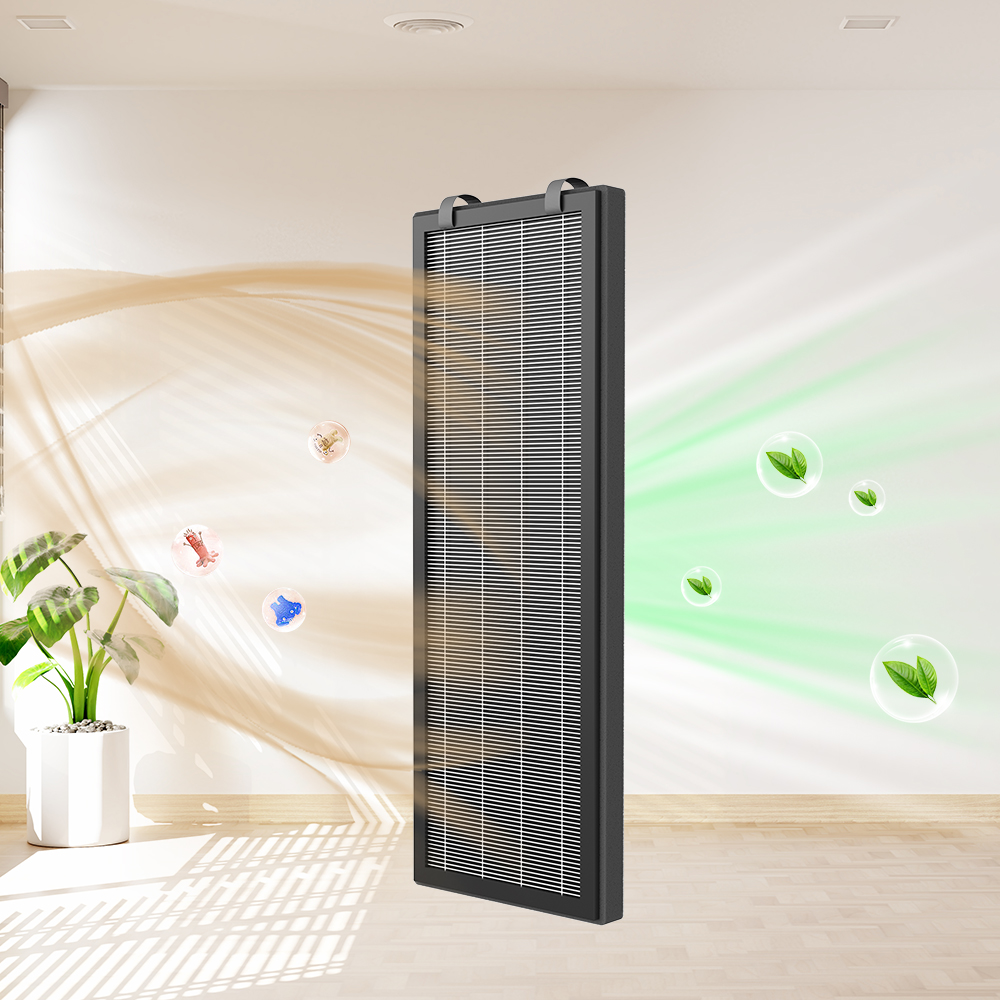
Filtro HEPA HisoAir de substituição para o purificador de ar
As origens e os avanços da tecnologia HEPA
Inicialmente desenvolvida pelo exército dos EUA durante a Segunda Guerra Mundial para filtrar partículas radioactivas, a tecnologia HEPA evoluiu para se tornar um componente crítico na purificação do ar para uso comercial e residencial. Os filtros HEPA actuais oferecem um fluxo de ar melhorado com uma resistência reduzida.
Desenvolvimento histórico dos filtros HEPA
Originalmente concebidos para uso militar, os filtros HEPA foram adaptados para satisfazer as necessidades de filtragem de alta eficiência em ambientes modernos, incluindo casas e locais de trabalho.
Avanços modernos na tecnologia HEPA
Os filtros HEPA modernos incorporam meios avançados que permitem um elevado fluxo de ar e uma baixa resistência, tornando-os mais silenciosos e eficientes nos purificadores de ar utilizados atualmente.
Porque é que os filtros HEPA precisam de filtros de carbono?
Embora os filtros HEPA sejam excepcionais na captura de partículas, não removem gases ou odores. Os filtros de carvão ativado complementam os filtros HEPA, adsorvendo os compostos orgânicos voláteis (COV) e os odores desagradáveis.
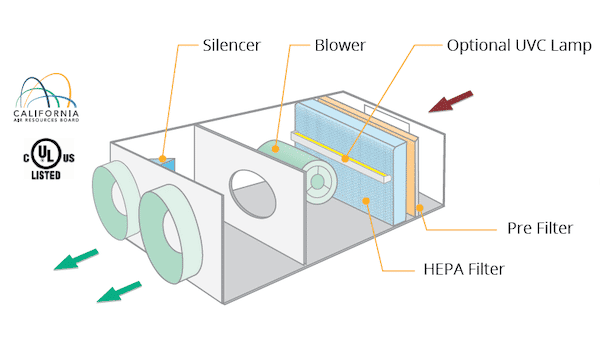
Um diagrama de um purificador de ar baseado em filtro
Filtragem abrangente com filtros duplos
A combinação de filtros HEPA com filtros de carvão ativado assegura uma purificação abrangente do ar, removendo tanto partículas como gases. Esta abordagem dupla é particularmente eficaz em ambientes onde os COV são uma preocupação.
Benefícios da utilização de filtros HEPA e de carbono
Em espaços com partículas e poluentes gasosos, a combinação de filtros HEPA e de carbono proporciona uma solução de purificação do ar completa, que aborda um espetro mais vasto de contaminantes.
Benefícios dos filtros HEPA nos purificadores de ar
Os filtros HEPA são uma opção altamente eficaz e de baixa manutenção para melhorar a qualidade do ar a longo prazo. Reduzem os contaminantes e proporcionam uma melhor qualidade do ar em qualquer ambiente interior.

Purificador na sala de estar
Porque é que os filtros HEPA são ideais para casas e espaços de trabalho
Os filtros HEPA reduzem os alergénios, o pó e o pelo dos animais de estimação, proporcionando um ar mais limpo e saudável no interior. A sua reduzida necessidade de manutenção torna-os uma escolha conveniente para uma utilização a longo prazo.
Duradouro e eficiente
Os filtros HEPA só precisam de ser substituídos a cada 6-12 meses, dependendo da utilização. A sua durabilidade e eficiência fazem deles uma escolha económica para uma gestão sustentada da qualidade do ar.
Conclusão
Os filtros HEPA oferecem uma solução comprovada para melhorar a qualidade do ar interior através da captura de partículas finas, garantindo ambientes mais limpos e saudáveis. Inicialmente desenvolvidos pelos militares, os filtros HEPA continuam a ser a escolha preferida para a purificação do ar em casas, locais de trabalho e instalações médicas, graças à sua segurança, fiabilidade e avanços contínuos.
-
[Eficiência de filtragem HEPA]: Os filtros HEPA removem 99,97% de partículas a 0,3 mícrones, o que os torna ideais para remover partículas finas e alergénios. ↩
-
[Utilização médica de filtros HEPA]: Os filtros HEPA são normalmente utilizados em instalações médicas para garantir um ar livre de agentes patogénicos e reduzir a contaminação. ↩
-
[Riscos da filtragem por ionização]: As tecnologias de ionização e plasma podem emitir ozono, que pode irritar o sistema respiratório. ↩
-
[Filtragem HEPA e COV]: Enquanto a HEPA é eficaz para as partículas, os COV requerem um filtro de carvão ativado para absorção. ↩ ↩



